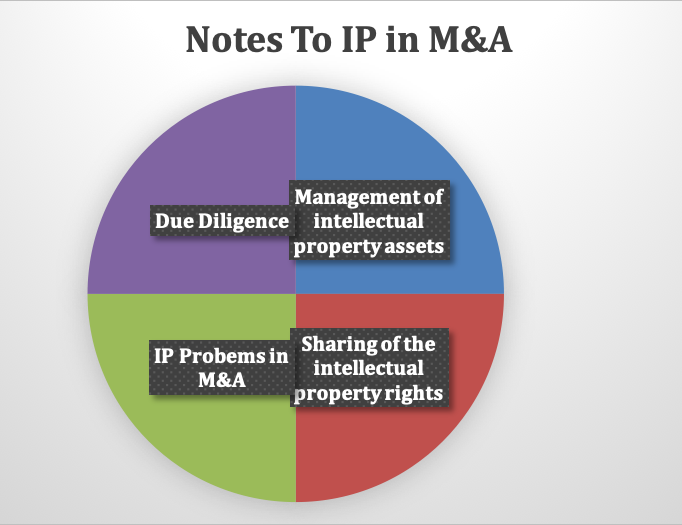Mergers and acquisitions (M&A) are activities that take control of a company through a merger or acquisition between two or more businesses to own a part or the whole of that enterprise. Typically, this merger and acquisition activities will evaluate a lot of the target company’s assets which includes intellectual property (IP) rights. M&A has become familiar and popular with the Vietnamese business community in the context of the booming economy in the last decade.
Due Diligence: Evaluation of intellectual property rights
Before signing any agreements in M&A activities, an indispensable activity must always be conducted and implemented carefully is Due Diligence – legal evaluation of enterprise which is the target of M&A.
Due Diligence (DD) of a business is a necessary and useful activity so that the parties in the transaction can understand the value of the target company as well as the legal, financial risks and any other risks that the purchaser may encounter if they decide to acquire the target company.
One of the important issues that are always taken carefully by DD is to evaluate the intellectual property rights of enterprise. This activity is primarily intended to identify an enterprise’s existing intellectual property assets by examining documents proving its ownership of an intellectual property object and determine whether there are any risks to these intellectual property rights. For example, whether the business is infringing upon the intellectual property rights of third parties, or whether there are any disputes in this regard or not.
In addition, it will also determine whether the enterprise’s intellectual property assets are solely proprietary or shared with other entities. Just in case these issues are clearly identified, the purchaser will have sufficient grounds for determining the value of the enterprise (intellectual property rights are only one of many bases for evaluation). However, the legal assessment of the intellectual property rights in practice is not as simple as the theories as aforementioned.

Intellectual property problems arising from M&A
There have been many M&A transactions arising problem regarding the intellectual property rights after completing the transaction. The most typical case is a recent case involving a commercial bank in the top 04 commercial banks in Vietnam – Agribank. 10 years ago, this bank established a subsidiary specializing in trading of gold, silver and gemstones in Vietnam.
At this time, the bank owns 100% of the capital of this subsidiary and allows the subsidiary to use its trademark “Agribank” in the company name. The bank has gradually divested all of its capital from this subsidiary and now the subsidiary has become a joint stock company and the bank no longer owns any shares at this company.
However, Agribank forgot to do the most important thing before losing its control at this subsidiary, which was to revoke the right to use the trademark “Agribank” of this subsidiary. As a result, the bank’s trademark “Agribank” is still used in the company name of such company. Until now the said company is using this trademark in its company name notwithstanding the harsh reaction from the bank.
The bank is now requiring the company which used to be its subsidiary to remove the trademark from the company name. The current case has not been successful and Agribank still has to spend a lot of time, money and effort in pursuing legal measures to achieve the desired results.
Another typical case related to the intellectual property rights after M&A is the case of a Commercial Bank. This bank was acquired by the State Bank for 0 VND in 2015. Although this acquisition is not a normal M&A deal (which is nature as an emergency measure of the State Bank of Vietnam to ensure the safety of the banking system).
However, the complicated issue is that during its existence and operation before being acquired in 2015, the Commercial Bank allowed many other companies to use and register the trademarks, logos which is similar or identical with its trademarks. As a result, although many companies are using logos and trademarks in their business activities which is similar to the Commercial Bank’s one, there is no legal relationship between these companies with this bank. In May 2019, the information released in the media indicated that the Commercial Bank could be sold to foreign investors under the plan of the State Bank of Vietnam to transfer and restructure this bank. If this plan is implemented, the investor that decides to acquire the Commercial Bank will also have to consider the actual use and trademark registration of this bank.
Legally, the latest Intellectual Property Law of Vietnam (amended and supplemented in 2019) only contains general provisions and principles on the transfer of ownership of industrial property rights (such as the main content of the assignment agreement, the requirement to registration as well as the procedure for registration of this agreement at the national office of intellectual property) so that organizations, individuals may carry out the assignment. Therefore, organizations and individuals in the course of their business activities need to determine by themselves the basic principles to ensure the best protection of their intellectual property rights.

Experience from management of intellectual property assets of international companies
Multinational companies, large corporations in the world all centrally manage their intellectual property rights. The registration and ownership of intellectual property assets are made uniformly by one subject without dividing them into many different subjects. However, in cases where it is necessary or required to divide the protection registration (to establish ownership) among different entities, there are still internal agreements between these entities to determine the ownership of the intellectual property rights in a variety of situations, including the transfer, acquisition, or merger of a business. In the event that a Letter of Consent is required to permit other organizations and individuals to register and use their trademark, there are still having a provisions to bind the licensee as well as the right to revoke the consent and thereby revoke the right to continue to register and use the trademark of the licensee.
Not many companies in Vietnam are aware of this problem during their business activities, which leads to the sharing, licensing, and permission to register and use their trademarks easily and without the strictly control and management.
Notes in sharing the intellectual property rights (IPR)
Sharing the intellectual property rights with other subject without any control or management is similar to giving up large and valuable assets in an enterprise and may lead to serious result in future for your business. In order to avoid the mistakes like Agribank or the Commercial Bank as aforementioned, in addition to registration of the intellectual property rights, businesses need to pay attention to the following issues:
- There is a need to establish and consistently implement the principle of centralized intellectual property protection within enterprises. Accordingly, avoiding the division, licensing or registration of protection of any objects of intellectual property rights belonging to your company whether the licensees are subsidiaries or affiliates without any reserve measure to revoke these objects when necessary.
- While still having the right to control of any enterprise, it is necessary to ensure that all intellectual property rights are acquired before being transferred or transferred to a third party (except for cases where the assignment also includes the assignment of the intellectual property rights) and must ensure that all administrative procedures related to the transfer and assignment are completed before losing the right of control, domination (according to the provisions of the Intellectual Property Law, the assignment agreement of industrial property rights must be registered with the National Office of Intellectual Property in order to take the effect).
- Perform well the protection of the intellectual property with any infringement of intellectual property rights of any third party in reality. Avoiding the coexistence with the subjects who are conducting acts of infringing upon your company’s rights.
- Consulting with experienced lawyers on intellectual property rights before making any transactions if necessary. The support from experienced lawyers can help businesses minimize the risks that may arise after the transaction.
The proper implementation of the above measures can help businesses minimize the risks which may arise as well as create the advantages in the negotiation process related to their M&A activities.
Lawyer Pham Duy Khuong, The article fully published on Vietnam Law Magazine
— Other related articles—-
Vietnam Intellectual Property Agent (Vietnam IP Agent-Vietnam IP Firm)
Vietnam IP Law Firm – Vietnam Patent Law Firm – Vietnam Trademark Law Firm
Intellectual Property Services

 Tiếng Việt
Tiếng Việt 中文 (中国)
中文 (中国)
